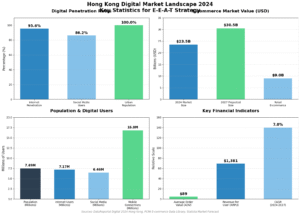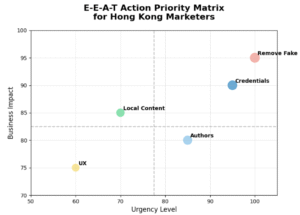Google’s 2025 E-E-A-T Update: What Hong Kong Marketers Must Do
Aug 13, 2025 | 3 Min Read

1. Introduction
Google’s January 2025 update to the Search Quality Rater Guidelines marks the most significant revision to E-E-A-T (Experience, Expertise, Authoritativeness, Trustworthiness) evaluation criteria since March 2024. This comprehensive 181-page update fundamentally reshapes how Google assesses content quality, introducing stricter criteria for authenticity and more granular detection of deceptive practices.
E-E-A-T has evolved from a simple content quality framework to Google’s primary weapon against the proliferation of AI-generated content and manipulative SEO tactics. The framework, which added “Experience” to the original E-A-T model in December 2022, now serves as the foundation for Google’s core ranking systems that prioritize “helpful, reliable, people-first content” over content created primarily to manipulate search rankings.
For Hong Kong marketers, this update carries particular significance. Operating in one of Asia’s most competitive digital markets—where cross-border e-commerce represents 56% of total online transactions and the average revenue per user reaches US$1,381—local businesses face unique challenges that make E-E-A-T compliance both critical and complex. Hong Kong’s position as a global trade hub, combined with its tech-savvy population (95.6% internet penetration) and multilingual market dynamics, requires marketers to demonstrate authenticity across cultural and linguistic boundaries while competing against both local and international players.
2. What’s New in the 2025 E-E-A-T Update?
Enhanced Deception Detection Framework
Google’s 2025 update introduces an expanded definition of “deceptive purpose” that extends far beyond traditional misinformation. The new guidelines specifically target three key areas of deception that have become increasingly prevalent:
Fake E-E-A-T Content: The update introduces unprecedented scrutiny of artificial authority signals. Google now explicitly identifies and penalizes:
Websites claiming physical “brick and mortar” stores when operating purely online
AI-generated author profiles with fabricated credentials and AI-generated photos
False claims of professional expertise, such as unqualified individuals posing as medical professionals
Deceptive Business Information: The guidelines now target businesses that misrepresent their operational reality, including fake physical addresses, manufactured company histories, and artificially inflated credentials.
Manipulative Design Elements: Google has expanded its focus on user interface deception, including buttons designed to mislead users (such as fake “close” buttons that trigger downloads) and misleading page titles that don’t match content.
Algorithmic Integration Signals
The update suggests Google’s algorithms are becoming more sophisticated at detecting these deceptive practices automatically. Marie Haynes, a leading SEO authority, notes in her analysis of the January 2025 guidelines that Google has introduced specific guidance on “scaled content abuse” and AI-generated content with fabricated authorship—indicating that algorithmic detection of these issues is now possible at scale.
Trust-First Evaluation Model
The 2025 update reinforces that “trust is most important” among the four E-E-A-T factors. This represents a shift from expertise-heavy evaluation to trust-centric assessment, where content lacking appropriate E-E-A-T for its purpose automatically receives a “Low” quality rating, regardless of other positive factors.
3. The Impact on Hong Kong’s Digital Landscape
Market Characteristics and Competitive Dynamics
Hong Kong’s digital ecosystem presents unique challenges that make E-E-A-T compliance particularly critical:
High-Value, Competitive Market: With an e-commerce market projected to reach US$23.5 billion in 2024 and growing at a 7% CAGR through 2027, Hong Kong represents one of Asia’s most lucrative digital markets. The average order value of US$89 indicates sophisticated consumers with high expectations for content quality and brand authenticity.
Cross-Border Complexity: Cross-border transactions representing 56% of Hong Kong’s e-commerce create unique E-E-A-T challenges. Local businesses must demonstrate expertise and trustworthiness to consumers who regularly interact with international brands like Taobao (20.9% market share) and Amazon (11% market share).
Multilingual and Multicultural Audience: Hong Kong’s diverse population requires content that demonstrates cultural expertise while maintaining authoritativeness across different linguistic contexts. This complexity makes fake or generic content more easily detectable and less effective.
Immediate Ranking Impact Scenarios
Based on the new guidelines, Hong Kong businesses in several categories face immediate ranking risks:
Financial Services: Hong Kong’s position as a global financial hub means YMYL (Your Money or Your Life) content faces the highest E-E-A-T standards. Financial advisors, investment platforms, and banking services without clear professional credentials and transparent business operations risk significant ranking drops.
E-commerce and Retail: With 41% of Hong Kong consumers purchasing clothing/accessories online and 37% booking travel, retail businesses using AI-generated product descriptions without clear human oversight, or fake customer reviews, face potential algorithmic penalties.
Health and Wellness: Healthcare-related businesses—particularly those serving Hong Kong’s aging population (21.9% aged 65+)—must demonstrate clear medical expertise and avoid any misrepresentation of qualifications.
4. What Marketers Must Do Right Now
a. Prioritize Authentic Experience
Implement First-Hand Experience Documentation:
- Create detailed process documentation showing how products are tested, reviewed, or used
- Include behind-the-scenes content that demonstrates genuine interaction with products/services
- For restaurants: Show cooking processes, ingredient sourcing, chef interactions
- For retail: Document product testing, quality assessment, customer service processes
Leverage Hong Kong-Specific Local Knowledge:
- Demonstrate understanding of local consumer preferences (e.g., mobile payment preferences—45% digital wallet usage)
- Show awareness of Hong Kong’s unique regulatory environment
- Reference local events, culture, and market conditions in content
Visual Experience Proof:
- Include authentic photos of your Hong Kong operations, team, and facilities
- Avoid stock photography for key business representations
- Create video content showing real employees and genuine business operations
b. Demonstrate Expertise and Authority
Professional Credential Verification:
- Ensure all claimed credentials are easily verifiable through external sources
- Link to professional associations, certifications, and educational backgrounds
- For YMYL topics, provide clear medical, financial, or legal qualification evidence
Industry Recognition Building:
- Secure mentions in reputable Hong Kong business publications (South China Morning Post, Hong Kong Business Magazine)
- Participate in local industry associations and events
- Develop relationships with Hong Kong media outlets for authentic coverage
Content Depth and Originality:
- Move beyond surface-level information to provide insights unavailable elsewhere
- Reference specific Hong Kong market data and trends
- Offer unique perspectives based on local market experience
c. Build and Maintain Trust
Transparent Business Information:
- Ensure accurate business registration details are publicly available
- Provide clear contact information, including verified Hong Kong addresses and phone numbers
- Maintain consistent business information across all online platforms
Customer Verification Systems:
- Implement verified review systems that prevent fake testimonials
- Display genuine customer feedback, including negative reviews when appropriate
- Use structured data markup to help Google identify authentic reviews
Clear Privacy and Data Handling:
- Publish comprehensive privacy policies compliant with Hong Kong’s Personal Data (Privacy) Ordinance
- Explain data collection and usage practices clearly
- Provide easy contact methods for privacy concerns
d. Optimize for Local Relevance
Hong Kong Search Behavior Adaptation:
- Optimize for local search patterns (89.4% internet penetration creates sophisticated search behaviors)
- Create content addressing Hong Kong-specific consumer pain points
- Develop FAQ sections addressing local concerns (shipping, customs, local regulations)
Multi-Language Strategy:
- Ensure content accuracy across Traditional Chinese and English versions
- Avoid machine translation without human oversight
- Demonstrate cultural understanding in language choices and content presentation
Local Business Integration:
- Participate in Hong Kong’s local business ecosystem
- Engage with local suppliers, partners, and service providers
- Show integration with Hong Kong’s business community
e. Continuous Content Quality Improvement
Regular Content Auditing:
- Implement monthly reviews of high-traffic content for accuracy and freshness
- Remove or significantly update outdated information
- Monitor competitor content quality improvements
Human Oversight Implementation:
- Ensure all AI-generated content receives human review and editing
- Implement editorial processes that verify claims and sources
- Create content creation guidelines that prioritize authentic expertise
6. Conclusion
Google’s 2025 E-E-A-T update represents a fundamental shift from content optimization to authenticity verification. For Hong Kong marketers operating in one of Asia’s most competitive and sophisticated digital markets, this change demands immediate strategic realignment.
The territory’s unique characteristics—high internet penetration (95.6%), sophisticated consumers (US$1,381 average revenue per user), and complex cross-border commerce dynamics—make E-E-A-T compliance both more challenging and more critical than in most other markets. The 56% cross-border transaction rate means Hong Kong businesses compete not just locally but against international players with established authority signals.
Success in the post-2025 E-E-A-T environment requires Hong Kong marketers to move beyond traditional SEO tactics toward genuine business authenticity. This means investing in verifiable expertise, transparent operations, and authentic local market integration rather than seeking ranking shortcuts.
The businesses that will thrive are those that view E-E-A-T not as an SEO compliance requirement but as a framework for building genuine competitive advantages in Hong Kong’s discerning digital marketplace. By prioritizing authentic experience, demonstrable expertise, verifiable authority, and transparent trustworthiness, Hong Kong marketers can not only comply with Google’s evolving requirements but also build sustainable competitive positions in one of the world’s most dynamic digital economies.
The time for reactive compliance has passed. Hong Kong marketers must now proactively build authentic digital presence that serves both algorithmic requirements and genuine consumer needs in this increasingly sophisticated market.
Curious about google SEO and digital marketing? Don’t miss my course“Big Data and Artificial Intelligence Marketing” — it’s designed to help you put ideas into action.
References:
- Google. (2024, November 23). Creating helpful, reliable, people-first content. Google Developers.
- Broadley, C. (2025, May 5). Google’s updated raters guidelines target fake EEAT content – Analysis of January 2025 Quality Rater Guidelines update. Search Engine Journal.
- Raptive. (2025, March 21). How to improve content quality according to Google’s latest Search Quality Rater Guidelines – Expert analysis of 2025 guidelines changes and practical implementation strategies. Raptive Resources.
- DataReportal. (2024, February 21). Digital 2024: Hong Kong. DataReportal.
- PCMI Payments & Commerce Market Intelligence. (n.d.). The evolution of Hong Kong’s e-commerce market. PCMI.
- Tucker, E. (2022, December 15). Our latest update to the quality rater guidelines: E-A-T gets an extra E for Experience. Google Search Central Blog.
- Single Grain. (2025, April 27). E-E-A-T strategies that guarantee Google’s trust in 2025. Single Grain.






